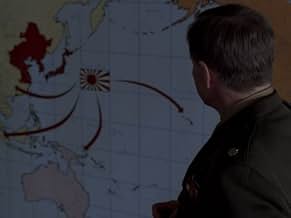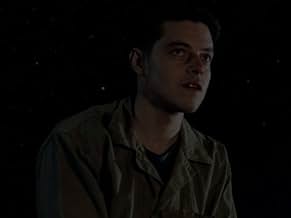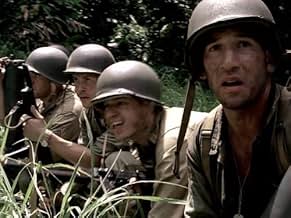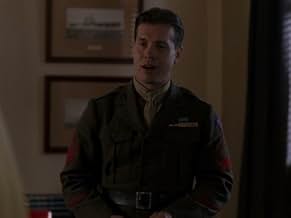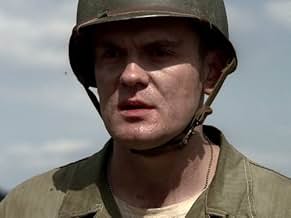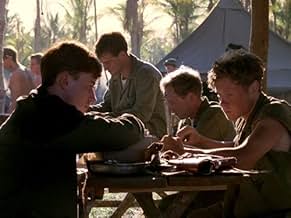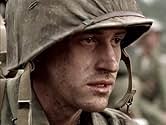The Pacific Theatre of World War II, as seen through the eyes of several young Marines.The Pacific Theatre of World War II, as seen through the eyes of several young Marines.The Pacific Theatre of World War II, as seen through the eyes of several young Marines.
- Won 8 Primetime Emmys
- 36 wins & 44 nominations total
Browse episodes
Featured reviews
I couldn't tell you how many times I have watched Band of Brothers. I think it is the best production ever made. However, I resisted watching The Pacific. My father had five years active duty in the Marine Corps when I was born, and remained on active duty until I was 30 years old. I was ten when he left for Viet Nam, the first time, and in high school the next. I had friends whose fathers were seriously wounded, or killed, there. I have always felt like Marines are family, and any depiction of them being killed has always been hard to see. However, I finally decided to "man-up" and watch it, on Veteran's Day this year.
I think BoB was a dream come true for the producers. They had ironclad characters to follow all the way through, and many of the men were still alive and took part in it. The story of Easy company had been put into book form, brilliantly. They didn't have that with The Pacific. The closest they could come was to base it all around three separate men; Robert Leckie,Eugene Sledge and John Basilone. The three men's paths crossed, some,but they did not belong to the same units or know each other, although Leckie and Sledge both knew Basilone's reputation.
As brutal and difficult as the war in Europe was, the Pacific war against the Japanese was almost incomprehensible. Except for their time in Australia, following Guadalcanal, they were fighting the most brutal fights in history, while in the most punishing places on earth.It is a wonder that any of them were ever able to return to civilization and dull the memories of those horrors enough to lead a more or less normal life.
Because of the brutality of both the enemy and the conditions they had to live and fight under, there isn't much in the way of light-heartedness. The Pacific is not as enjoyable as BoB. Anyone seeing it for the first time should not expect to be entertained. It is a bit more difficult to get into. I found it helpful to watch the first episode twice before going on. A little patience in getting to know the primary characters payed off. I also think being able to watch it all over the course of a few days, like I did, was much better than watching it as it was first presented, one episode each week for ten weeks.
There were some excellent performances in The Pacific. Someone else singled out Ravi Malek's portrayal of Merriel "Snafu" Sheldon as award worthy and I agree 100%! I loved William Sadler as LtCol. Lewis "Chesty" Puller, and I was also very impressed with Tom Budge as PFC Ronnie Gibson.
The three primary characters are portrayed worthily. I didn't think Joe Mazzello as Sledge developed his character as well as the other two. However, I ended up with only nine episodes on my DVR. The one I am missing is episode five, which I suspect is centered on Sledge, so perhaps the character will seem better developed to me after I see it. Jon Seda gave a fine performance as John Basilone, which was definitely the roll of a lifetime! I think my favorite of the three was James Badge Dale, as Bob Leckie.
I wasn't as depressed by seeing a portrayal of so many Marines being killed and wounded as I expected. That was partly because not many of them really looked like Marines to me. I have always said that you can put an actor in the Marine Corps uniform but you usually can't make him look like a Marine. There were a few, though, who were totally believable including Jon Seda. Others have commented on the length of the men's hair as being distracting and/or inaccurate. By my first memories, in the mid-late 50s, Marines were wearing the crew-cuts and flat-tops that they have worn ever since. However, I have pictures of my dad in uniform, from a decade earlier, with longer hair, so I think the producers knew what they were doing there.
Although I agree with most posters here, that The Pacific is not as good as BoB, it is still well-done and definitely worth seeing. I think watching it with an open mind, and avoiding comparisons, it is a good way to approach it.
One last comment I have is that I wonder why one young Marine, who was killed on Iwo Jima at age 17, was singled out in the tributes at the end. I assume they meant that to symbolize the thousands of young men who were killed, and it was very effective, IMO. But I would be interested to know why they chose the one they did; if perhaps someone involved in the production was a relative of the young man. I won't say his name for those who might not have seen it yet, but I will always remember it.
I think BoB was a dream come true for the producers. They had ironclad characters to follow all the way through, and many of the men were still alive and took part in it. The story of Easy company had been put into book form, brilliantly. They didn't have that with The Pacific. The closest they could come was to base it all around three separate men; Robert Leckie,Eugene Sledge and John Basilone. The three men's paths crossed, some,but they did not belong to the same units or know each other, although Leckie and Sledge both knew Basilone's reputation.
As brutal and difficult as the war in Europe was, the Pacific war against the Japanese was almost incomprehensible. Except for their time in Australia, following Guadalcanal, they were fighting the most brutal fights in history, while in the most punishing places on earth.It is a wonder that any of them were ever able to return to civilization and dull the memories of those horrors enough to lead a more or less normal life.
Because of the brutality of both the enemy and the conditions they had to live and fight under, there isn't much in the way of light-heartedness. The Pacific is not as enjoyable as BoB. Anyone seeing it for the first time should not expect to be entertained. It is a bit more difficult to get into. I found it helpful to watch the first episode twice before going on. A little patience in getting to know the primary characters payed off. I also think being able to watch it all over the course of a few days, like I did, was much better than watching it as it was first presented, one episode each week for ten weeks.
There were some excellent performances in The Pacific. Someone else singled out Ravi Malek's portrayal of Merriel "Snafu" Sheldon as award worthy and I agree 100%! I loved William Sadler as LtCol. Lewis "Chesty" Puller, and I was also very impressed with Tom Budge as PFC Ronnie Gibson.
The three primary characters are portrayed worthily. I didn't think Joe Mazzello as Sledge developed his character as well as the other two. However, I ended up with only nine episodes on my DVR. The one I am missing is episode five, which I suspect is centered on Sledge, so perhaps the character will seem better developed to me after I see it. Jon Seda gave a fine performance as John Basilone, which was definitely the roll of a lifetime! I think my favorite of the three was James Badge Dale, as Bob Leckie.
I wasn't as depressed by seeing a portrayal of so many Marines being killed and wounded as I expected. That was partly because not many of them really looked like Marines to me. I have always said that you can put an actor in the Marine Corps uniform but you usually can't make him look like a Marine. There were a few, though, who were totally believable including Jon Seda. Others have commented on the length of the men's hair as being distracting and/or inaccurate. By my first memories, in the mid-late 50s, Marines were wearing the crew-cuts and flat-tops that they have worn ever since. However, I have pictures of my dad in uniform, from a decade earlier, with longer hair, so I think the producers knew what they were doing there.
Although I agree with most posters here, that The Pacific is not as good as BoB, it is still well-done and definitely worth seeing. I think watching it with an open mind, and avoiding comparisons, it is a good way to approach it.
One last comment I have is that I wonder why one young Marine, who was killed on Iwo Jima at age 17, was singled out in the tributes at the end. I assume they meant that to symbolize the thousands of young men who were killed, and it was very effective, IMO. But I would be interested to know why they chose the one they did; if perhaps someone involved in the production was a relative of the young man. I won't say his name for those who might not have seen it yet, but I will always remember it.
The Pacific miniseries will leave many of you in a state of awe. What a cinematic achievement. The best of the best of what American entertainment has to offer. The scenes and emotions portrayed are so vivid and lifelike that you'll think you've been transported back in time to the pacific theater of war. History has told us how horrid the war against the Japanese was. A war of attrition. This series will take you there and slap you on the wrists and then the face and remind you of the truth. War is utter diabolical hell. And the guys that fought in the pacific during WW2 were tough as nails. Tougher. It's ugly and beautiful at the same time. Enjoy and take a history lesson. You'll thank your lucky stars you did.
The Pacific... every time I come across this series I always want to watch it again. The show really shows you what the soldiers that fought in WW2 felt and went through. It's series like this that keep the memory of those brave soldiers who fought for their country alive. And also, the opening theme is... Just hear it for yourself.
10follis12
The war in the Pacific was a hell of a lot different than the war in Europe. Of course both where terrible - full of death, sacrifice, and heroism. However, it seems the soldier's stories from the European theater have gotten a lot more press.
The US Marines in the Pacific lived like animals in the most horrible environments imaginable. On top of fighting an enemy committed to kill them at all cost and never surrender, they battled the mud, heat, malaria, near starvation, and isolation for months on end.
Basically, it was a total nightmare, and the heroism of all the US Marines in the Pacific theater is nothing short of awe inspiring. The Pacific tells this story well. It is a must see on the topic of WW2.
The US Marines in the Pacific lived like animals in the most horrible environments imaginable. On top of fighting an enemy committed to kill them at all cost and never surrender, they battled the mud, heat, malaria, near starvation, and isolation for months on end.
Basically, it was a total nightmare, and the heroism of all the US Marines in the Pacific theater is nothing short of awe inspiring. The Pacific tells this story well. It is a must see on the topic of WW2.
If you want to see the Pacific version of HBO's critically acclaimed "Band of Brothers", change the channel
"The Pacific" differs from "Band of Brothers" whereas the "The Pacific" focuses on the war itself and "Band of Brothers" focused on the characters. Both miniseries are championed by Hollywood heavy-hitters Tom Hanks and Steven Spielberg who were contributing writers and producers of both miniseries.
Perhaps the greatest distinction between the two mini-series was intentional. It is clear that the soldiers in the Pacific theater fought a different kind of war than those fighting in Europe. "The Pacific" is a gritty if not gory depiction of a war against not just the Japanese, but also the elements. The cast is made-up of some brilliant actors we are sure to see again in future projects. What makes "The Pacific" so good is the intense realism which brings the viewer into the battle from the safety of your couch. If there is hell on earth, you will find it here.
The army they are fighting is alien; both mysterious and ferocious. They are looked at with both awe and disdain and the Americans want to kill them all. However, there is a palpable sense fear among the men that this enemy will never surrender and will fight beyond what they feel is humanly if not morally possible. When one character hears about the Kamikaze's flying their planes into ships, he asks aloud "how can any man do that?" "The Pacific" is fast-paced and each episode leaves the viewer wanting more.
What lacks in the series is the intimacy of knowing the characters. They are kept at a distance almost as if the character doesn't want to let you in. This may be the intent of the writers; just as the soldiers took little interest in knowing each other, maybe we are not meant to know the characters.
"The Pacific" differs from "Band of Brothers" whereas the "The Pacific" focuses on the war itself and "Band of Brothers" focused on the characters. Both miniseries are championed by Hollywood heavy-hitters Tom Hanks and Steven Spielberg who were contributing writers and producers of both miniseries.
Perhaps the greatest distinction between the two mini-series was intentional. It is clear that the soldiers in the Pacific theater fought a different kind of war than those fighting in Europe. "The Pacific" is a gritty if not gory depiction of a war against not just the Japanese, but also the elements. The cast is made-up of some brilliant actors we are sure to see again in future projects. What makes "The Pacific" so good is the intense realism which brings the viewer into the battle from the safety of your couch. If there is hell on earth, you will find it here.
The army they are fighting is alien; both mysterious and ferocious. They are looked at with both awe and disdain and the Americans want to kill them all. However, there is a palpable sense fear among the men that this enemy will never surrender and will fight beyond what they feel is humanly if not morally possible. When one character hears about the Kamikaze's flying their planes into ships, he asks aloud "how can any man do that?" "The Pacific" is fast-paced and each episode leaves the viewer wanting more.
What lacks in the series is the intimacy of knowing the characters. They are kept at a distance almost as if the character doesn't want to let you in. This may be the intent of the writers; just as the soldiers took little interest in knowing each other, maybe we are not meant to know the characters.
Did you know
- TriviaDuring his audition, Rami Malek (Snafu) noticed that the man running the camera was not, as is typical, a young assistant, but an older gentleman who was doing some "very elegant camera work." Midway through his scene, he realized that the camera operator was actually Steven Spielberg.
- GoofsAt about 1:20 into the opening credits, a Navy ship sails into view from the left. On the bow is a small vertical mast (the jackstaff) flying a small flag (the Jack). The Jack and jackstaff are only used when the ship is anchored or moored never when it is underway.
- ConnectionsFeatured in The 62nd Primetime Emmy Awards (2010)
- How many seasons does The Pacific have?Powered by Alexa
Details
- Release date
- Countries of origin
- Official site
- Languages
- Also known as
- The Pacific
- Filming locations
- Production companies
- See more company credits at IMDbPro
- Runtime
- 1h(60 min)
- Color
- Sound mix
- Aspect ratio
- 1.78 : 1
Contribute to this page
Suggest an edit or add missing content





